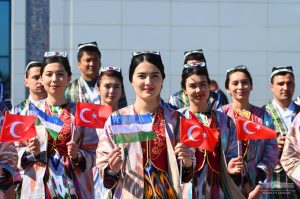Even as Turkey is in the European spotlight for hosting talks between Russian and Ukrainian officials this week, Turkish President Recep Tayyip Erdogan touched down Tuesday in the Uzbek capital, Tashkent. At the invitation of Uzbek President Shavkat Mirziyoyev, Erdogan arrived for a two-day visit aimed at further developing bilateral ties. After talks, and the commissioning of a new thermal power plant, the two presidents declared the elevation of relations to a “comprehensive strategic partnership.” There was also no shortage of photo-ops at historical sites, with both presidents accompanied by their wives on a trip to Khiva.
Like many of Uzbekistan’s foreign relations, ties with Turkey experienced a revival after the 2016 death of Islam Karimov.
In the 1990s, Turkish-Uzbek relations suffered after Ankara declined to extradite exiled Uzbek opposition figures. Uzbekistan cut off visa-free travel and shuttered Gulen schools in the country, at the time a key aspect of Turkey’s soft power. Relations further deteriorated when Turkey sided with the United Nations in condemning Tashkent for the 2005 Andijan massacre. With Karimov’s death, a door opened for rebuilding relations.
Erdogan visited Uzbekistan in November 2016 for talks with then-acting President Mirzyoyev. The following year Mirziyoyev visited Turkey, the first official visit to the country by an Uzbek president since 1999. Also in 2017, the two sides resumed Joint Economic Commission meetings and in 2018 they introduced plans for a biannual Turkey-Uzbekistan High-Level Strategic Cooperation Council. Ankara held the first meeting in 2020; Erdogan’s present trip to Uzbekistan marks the second such meeting.
After their negotiations, the two sides announced the signing of 10 documents, including a preferential trade agreement and a framework agreement on military and defense cooperation. They also announced the upgrading of ties to a “comprehensive strategic partnership.” Erdogan, meanwhile, suggested holding council talks annually, rather than every two years.
During the visit, the two presidents attended the commissioning of a new $150 million 240 MW thermal power plant in Tashkent and marked the start of construction of a $140 million 220 MW piston gas power plant planned for the Syrdarya region. The new thermal power plant in Tashkent, built by Turkish company Cengiz Enerji, is supposed to produce 1.9 billion kWh of electricity annually. The plant in Syrdarya, being built by the same company, is projected to open in September 2022 and anticipated to produce 1.76 billion kWh of electricity per year, according to the Uzbek Ministry of Energy. Given Uzbekistan’s booming energy demands, these projects are significant.
Also significant has been the growth in bilateral trade, especially since 2016. In 2016, bilateral trade amounted to just over $1.2 billion. Trade surpassed $2.1 billion in 2020 and according to the two president’s remarks exceeded $3.6 billion in 2021. Although trade has grown on both sides of the ledger, Uzbekistan has become a much more open market for Turkish goods since 2016. For example, in 2015 Turkish exports to Uzbekistan sat around $517 million, with Uzbek exports to Turkey higher at $718 million. By 2020, Turkish exports to Uzbekistan were valued at around $1.18 billion with Uzbek exports to Turkey around $1.01 billion. Interestingly, in 2015 cotton accounted for just 5.55 percent of Uzbek exports to Turkey but by 2020 amounted to 21.7 percent. The recent rescinding of the cotton boycott, given progress in eliminating forced labor in Uzbekistan, could see that percentage rise further.
Turkish commentators have described Russia as a main rival in courting Uzbekistan, adding a layer of complexity to their growing ties. Just as Mirziyoyev opened Uzbekistan to its neighbors, it did so also rather indiscriminately to partners farther abroad, including Russia and China. This has meant a significant repairing of relations with Russia, which, given the present war in Ukraine, may present some difficulties. The moment also presents opportunities for a partner like Turkey. Ankara may be perceived as less meddling than Western countries while providing a “gateway” to markets in the West that can remain more reliably open at time when Russia is hemmed in by sanctions.

































